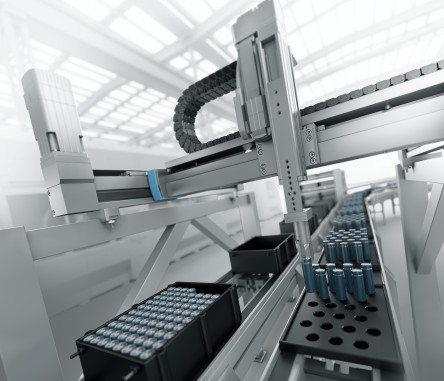
EV and battery manufacturing plants are high-volume, modern production facilities that seamlessly integrate factory and process automation. This high level of industrial automation ensures the precision, uniformity, and stability needed to achieve stringent safety and performance requirements.
The introduction of innovative technologies and methodologies directly impacts skills requirements, creating skills deficits among workers that can quickly lead to critical situations on the production floor.

Foster relevant skills for advanced manufacturing.
For workers to thrive in an Industry 4.0 environment, they need a broader range of skills for high-versatility and productivity, as well as an overall system-level understanding. Strong digital literacy and troubleshooting skills are essential. And wide-ranging soft skills, such as critical thinking, communication, collaboration, and creativity, enable competent decision-making and problem-solving in cross-disciplinary teams. Additionally, adapting to an environment prone to rapid changes calls for lifelong learning skills.
Consequently, teachers and industry training managers must invest significant resources to adapt – or create – training programs aligned to industrial skills requirements. Privileged collaboration with leading battery and auto manufacturers gives us valuable insights into their needs for reskilling and upskilling current workers and onboarding new hires.
Essential areas for production workers
Skilled production workers, such as operators and maintenance technicians, represent a substantial proportion of labor needs. Depending on their positions, they are responsible for installing, operating, monitoring, maintaining, troubleshooting, and replacing production equipment.
To enhance their productivity, they should have relevant knowledge and skills in the following areas and topics:
Battery production
Cell, module, and pack. Components and raw materials. Electrode production. Cell assembly. Formation and aging. Logistics and material handling. Process quality and data management. Process environment. Waste handling. Process and product safety. Future trends. Challenges in production. And more.
Fluid power systems
Actuators. Air preparation. Vacuum technique. Grippers. Tubes and fittings. Force control. Pneumatics-Hydraulics analogy. Pressure switches. Electromagnetically actuated valves. Symbols and circuit reading. Physical principles. Structure and mode of operation. Pressure and flow measurement. Valves and actuating elements. Basics of proportional hydraulics. Critical phases and implicit risks. And more.
Sensors and data
Industrial controls. Fundamentals of electrical engineering. Diagrams. Basic logic functions. Direct and indirect activation. Control loops. Recording of signals. Self-holding circuits. Pushbuttons, switches, and detectors. Relays and contactors. Timers. PLC. Smart Sensors. Robotics. And more.
Instrumentation and process control
Control systems understanding. HMI. SCADA. MES. Sensors and transducers. Temperature sensors. Pressure sensors. Level sensors. Flow sensors. Final elements and process valves. Instrumentation diagrams. And more.
Electrical and mechanical drives
Motors (DC, synchronous, asynchronous). Motors (servo, stepper). Bearings and couplings. Belt drives and pulleys. Chain drives and wheels. Gears. Lubrication. And more.
Industrial maintenance
Basic use of meters. Basic and advanced troubleshooting. Preventive and predictive maintenance. Data analysis. Electrical and mechanical troubleshooting. System isolation. Equipment optimization. Dimensional metrology. Pumps. Rigging. Pipefitting. Wiring. And more.
Operational excellence
Total productive maintenance. Energy efficiency. Troubleshooting method development. Continuous improvements. Intro to Industry 4.0. Lean manufacturing. 5S workplace organization. Materials science. Poka Yoke. And more.
Quality, safety
Geometric and dimension tolerancing (GD&T)/geometrical product specifications (GPS). Statistical process control (SPC). Electrical norms and regulations. Electrical personal protective equipment. Machine safety (SIL, PL, etc.) and interlock. Safety control elements and categories. Operating principles of safety modules. Stop buttons. Protective barriers. Lock-out/Tag-out methodology. Energy discharge. And more.
Additional areas for engineers
Many types of engineers, such as electrical, electronic, software, and chemical, are also in demand in the EV and battery manufacturing sector. They are involved at all levels: research and development, design and planning, and production.
In addition to the skills and knowledge required for production workers, engineers must also demonstrate proficiencies and competences in the following critical areas:
Electric powertrain
Powertrain control and features. Engine, transmission, and driveshaft. Electric motors. Sensing and actuation. Power generation. Energy consumption. Braking systems. Regenerative Braking. Automotive mechatronics. And more.
Power electronics
DC power electronics: Diode, switching transistor, high-speed switching, ripples, battery charger, choppers, and more. Single- and three-phase AC power electronics: Rectifiers, diode rectifiers, PWM inverter, and more. Thyristor Power Electronics: Solid state relay, AC power control, rectifier/inverter. And more.
Battery technology
Fundamental characteristics. Series and parallel circuits. Various battery types. Battery banks and packs. Charging. Discharge. Energy density. Battery management system and balancing batteries. And more.
Charging infrastructure
Charging stations and methods. Power conversion and storage. Smart grid. Distribution networks. Renewable energy production. And more.
Energy management
Energy efficiency. Consumption monitoring. Power supply. Optimization. And more.
Networking, cybersecurity
Networks and IT security. Device security. Threat and risk analysis. Intrusion protective systems. And more.